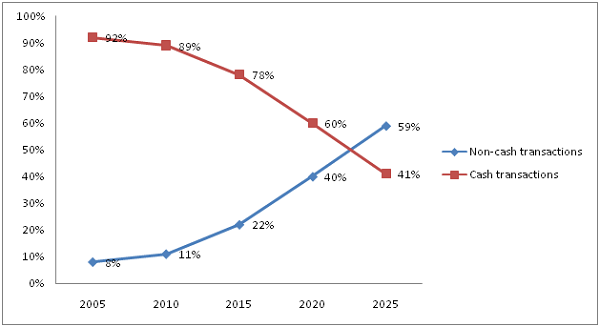Among 141 participating countries, India ranked 81st on the Global Innovation Index in 2015. This year, India’s ranking improved to 66th. This is all thanks to the developments India has been making. The latest such development is demonetisation. It has increased the country’s dependence on digital payment processes. Other countries have been using the digitised medium of payments for a long time. But Indians were wary about the same. Only a small percentage used cashless transactions. But since 8 November 2016, the number of cash transactions has reduced significantly. Digital payments have become the mantra.
What are digital payments?
These are payments carried out electronically through the use of mobile wallets, net banking, mobile banking, or debit, credit, and EMI cards. Digital payments cut out the need for cash altogether.
Has India evolved to accept such digital means of payments?
Earlier, cash transactions dominated the Indian marketplace. Post demonetisation, digital payments are taking over such cash transactions. The Boston Consulting Group (BCG) published a report titled ‘Digital Payments 2020’. This report presents the trend in India’s cash and non-cash transactions over the years.It also provides a forecast for the years to come:

The dependence on cash transactions was higher previously. But there is now a gradual shift as non-cash transactions find more takers.
The potential for digital payments in India
The BCG report also outlines the demographic composition of India in terms of the potential for digitised payments. Here is an overview:
| Year | Population | Mobile phone users | Internet users |
| 2015 (actual figures) | 1,250 million | 1,000 million | 300 million |
| 2020 (expected figures) | 1,350 million | 1,200 million | 650 million |
Though the population increases by 10%, the number of internet users is likely to double.
Why digital payments?
Would you resort to something new if you did not get any benefits? Well, digital payments are also beneficial. This is even apart from their becoming compulsory due to the cash crunch. Here are some of the benefits provided by digitised payment processes.These advantages are absent in cash transactions:
- Easy and convenient:Cash transactions were considered easy. But this adjective is now used to describe digitised payments. Payments through cards, e-wallets, and United Payment Interface (UPI)media, for example, are becoming easier. Moreover, with cash almost absent from circulation, digital payments present the perfect substitutes.
- Cash-backs and discounts:E-wallets are cashing in during the aftermath of demonetisation. They are offering attractive cash-back deals and discounts on digital transactions. Credit cards reward cardholders through reward points that you can redeem later. They also allow discounted rates at various merchant outlets. These offers help you to save money.
- Government initiatives:Even the Indian government is offering attractive discounts on digital payments. For instance, railway passengers booking an online ticket can avail a free accidental insurance cover of Rs 10 lakh. Public sector insurers are allowing a discount of 10% on the premium payable for general insurance policies.The discount is 8% for life insurance policies. Payments at toll plazas on National Highways made using RFID cards or Fast Tags would also attract a 10% discount.
The present government has envisioned a Digital India.And with the latest move of banning Rs 500 and Rs 1000 notes, cashless transactions are the way ahead. With offerings such as the EMI card, Bajaj Finserv is allowing consumers to participate in cashless transactions and use digital payments.
For instance, you can buy the latest products from your favourite brands without the need for physical cash. You can simply walk into a partner store, select the product of your choice, choose the most convenient EMI offer and pay instalments with the EMI Card. Simple enough, right?
Join in the digital revolution and opt for the smarter way to make payments.




Digital Payments for wish fulfilment, make a move & switch to smarter options. Go cashless,buy peace!
It’s a digital revolution, do your bit and switch to smarter moves with EMI options, Debit cards and mobile apps.
Don’t change the buying behaviour, adjust your shopping spend and stay gloomy! There’s so much in offering!
Let Digital india not be a distant dream, let’s go cashless and make use of cash backs and discounts!
Digital payments are easy and convenient to use, let’s make a move and go cashless for Indian Economy.